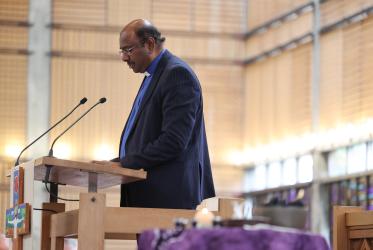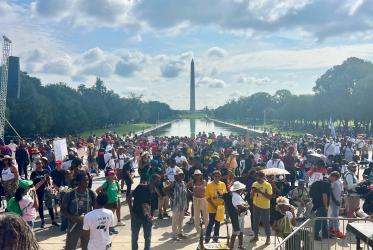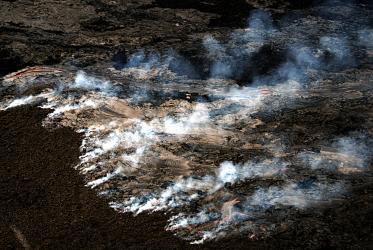December 2-5, 2007 in Johannesburg, South Africa
Make a joyful noise to the Lord all the earth.
Know that the Lord is God.
It is God who has made us and we are God's.
(Psalm 100: 1 and 3)
Some 45 participants from all regions of the world sang and danced to a Kenyan song whose refrain repeated "Let us sing to the Lord". They wanted to remind themselves of the beauty and wonder of creation, even while confronting the stark challenges of new technologies. Only a few kilometers from Soweto and the Apartheid museum, in the opening session they heard the stark rejoinder "Biotechnology in many of its current applications, like the apartheid system before it, thrives on and leads to the indignity of persons and communities."
This consultation was hosted by the South African Council of Churches (SACC) acknowledging South Africa's role as a science and technology centre on the African continent. The initiative for the consultation grew simultaneously from the Canadian Council of Churches and the National Council of the Churches of Christ USA together with the World Council of Churches and the SACC. Envisioned as an opportunity for networking among concerned people, members of advocacy groups, theologians and scientists, representatives of churches and ecumenical partners, the consultation boldly faced the complexity of the issues born of scientific advance and commercial interests. One outcome of the consultation was diversity expressed as solidarity.
Convictions and perspectives
Genetic advances and new biotechnologies force the churches to reaffirm the dignity of human beings and the integrity of the web of life. The creativity of science needs to serve the common good. This note was a shared theme in all theological contributions to the consultation. Where the dignity is violated because human beings are reduced to mere commodities, churches are compelled to speak and act. Where the web of life threatened or disrupted by human intervention, churches will advocate for the restoration of just relationships between human beings and other life. Justice for the poor and the suffering creation is the compelling call to the Biblical witness.
The teachings of the churches need to be further developed in response to the challenges of biotechnology and the impact it has on peoples' lives. Underlying assumptions about the value and trajectory of life require deeper theological reflection. These are a common task that depends much on the contextual realities and benefits from shared discernment. Those closer to the centers of research and technological advance see the need for dialogue with scientists, wishing to move beyond a reactive mode. They also want to foster the science to serve the common humanity. Those who are closer to peasant communities and other marginalized groups underline their experience that communities can be devastated by the intrusion of genetically modified seeds and bio-piracy. They even conclude: "biotechnology now serves primarily to enhance corporate profit and thereby reduces human beings to mere consumers".
The context of unjust international relationships often blocks the capacity of people to find common ground. The consultation discovered that one of the most valuable resources to address this challenge can be found through the diverse and wide ranging perspectives. Commonly people from North and South find themselves in conflict because of the different realities they face. The solutions they look for are often seen as mutually exclusive because of the inequitable distribution of economic and political power. Networking and solidarity under these conditions are not just a matter between North and South. Full solidarity is as a much a matter between South and South and North and North as it is between South and North. Hence the consultation's emphasis on networking and mutual accountability and the co-operation between the different ecumenical partners. The journey ahead will require a strong commitment to mutual accountability and candid encounter by all partners involved.
Valuing peoples and cultures
Indigenous Peoples have been guardians of biodiversity and cultivated many of the plants used for agriculture. Their knowledge is essential to future life and survival of humankind. This is not sufficiently valued. Instead, Mexico, though the heirs to 12000 years of a corn (maize) culture, come to face the risk of the demise of their culture. Long they told themselves, "The maize made people and people made the maize". Contamination of their fields through the illegal import and use of genetically modified corn and the dumping of surplus production is seriously undermining the lives and livelihoods of people, and more devastating still, their identity, spirituality and culture. The commodified crop has nothing in common with the sacred plant, the gift of creator God.
These themes were echoed again and again from the canola fields of Canada, to the sugar cane fields in the Caribbean, Africa and the Pacific, to those who struggle with the agro-export model of genetically modified soy in Latin America, and to 120,000 Bt cotton farmers who committed suicide in India because of crop failure. Violation of the human rights of farmers often hand in hand with violence against women and children and other groups was reported from many countries. Driven by the global market economy and unjust political systems, biotechnology promised increased production, but in the context of injustice and violence it results in increased dependency and threat to biodiversity. The new emphasis on agro-fuels threatens to further monocultures, expulsion of peasants, land speculation, pollution, and disease while raising food prices.
Urban and rural citizens have the right to access healthy food in keeping with their culture and therefore do not want to be reduced to mere consumers. This must always be at the heart of those among us who are engaged for the labeling of genetically modified products and the enforcement of regulatory frameworks in mobilizing the purchasing power of consumers. Even the exercise of consumer choice in favor of life must be seen as a privilege and operates within a framework that is hostile to these communities. Labeling of genetically modified products is only the second best choice in the absence of more fundamental justice.
Beyond the human species
Poor communities are more at risk during drug development - for example in clinical trials for HIV, reproductive technologies and diabetic research - and lack access to pharmaceutical products that are expensive under patent regimes and other legal, political and social machineries which prevent access to drugs. Perhaps the greatest arrogance to be confronted is any claim to "perfect" all life and in particular the human species. This irreverence denies the sacred relationship between creator and creatures. It ignores the vulnerability and finiteness of life. It opens the door for new divisions in human community that go far beyond the past and present experiences of racism, sexism, ableism and other deeply entrenched denials of human dignity. The commodification of human life in pre-natal diagnostics, some forms of research cloning and stem cell research as well as enhancement techniques must now increasingly be faced by churches and the wider public. Yet, even these are trumped by the dreams of so called trans-humanists. Their vision of constant perfection of human beings beyond the boundaries of the species entails a nightmare not only for people with disabilities, but ultimately for all people.
The prophetic voice of the ecumenical community
There is a great need for global ecumenical literacy on the many dimensions of the new convergent technologies that have been enabled by the digitalization of information in different spheres of life. A central commitment of the consultation was the restoration of the churches' prophetic voices and public witness in the growing debate regarding the ethical use of genetics and biotechnologies. It was affirmed that theological reflection needs to be contextual and engaged in the transformation of the situation together with those most directly affected. But how to arrive at common voice of the ecumenical family in inter-contextual encounters describes well the task ahead and requires drawing deeply on different Christian traditions of practical wisdom and wisdom traditions in other faith communities. The kind of networking modeled here and to be pursued in the future can enable the churches and ecumenical partners to find their voice and speak their truth within local settings, in national and global advocacy and in a religiously pluralistic world.
The following steps agreed upon by the participants are first steps in fulfillment of these commitments. They are to be carried forward by sub-groups of the consultation:
- Education: Envisioned here is the development of a compendium of educational resources, which can be circulated to colleagues electronically; the development and maintenance of an electronic conversation on ongoing basis; the development of an ongoing network to be expanded as possible.
- Theological Discourse: The group explored the themes of anthropology, inter-contextual approach to doing theology, ecclesiological implications; exploring issues of unequal power distribution also in the ways they affect the discourse through the sharing of written materials and an ongoing consultative process (South-South, North-North, South-North); encouragement of learned societies to work on issues related to genetics and biotechnology in the widest possible sense including environmental issues. Public theology is a promising new avenue to inform the churches public witness.
- The ethics of embryonic stem cell research: the group pledged to follow developments in genetic research and its human applications, carefully reflecting on their theological implications and effects with each development.
- Genetically modified organisms in agriculture: support the proposal of a commercial moratorium on the export and import of agro-fuels; greater emphasis on the alternative framework of sustainable/life-giving agriculture and the need to modify our energy consumption patterns as the main way to address climate change and the water scarcity crisis through networking among participants and other partners; strict standards for the planting and transborder trade of GMO products; protect the human rights of the farmers that are being affected by monoculture GMO crops and also the economic violence they are subjected to and resulting in migration and hunger.
- Converging technologies: exchange of materials on nano-, bio-, information-, cognitive technologies and synthetic biology and sharing of information with the group as a whole.
- Advocacy, locally and globally: intentional efforts to improve the impact of multi-faceted political intervention through greater cross-sectoral and cross-regional sharing of information, models and practices; improving the churches capacity for public witness through co-operation with civil society actors and ethical and theological reflection provided by other groups in the network.
Participants of the consultation evoked the theme of the 2006 Assembly of the World Council of Churches in praying together: "Heal us. God in your grace, transform the world."



